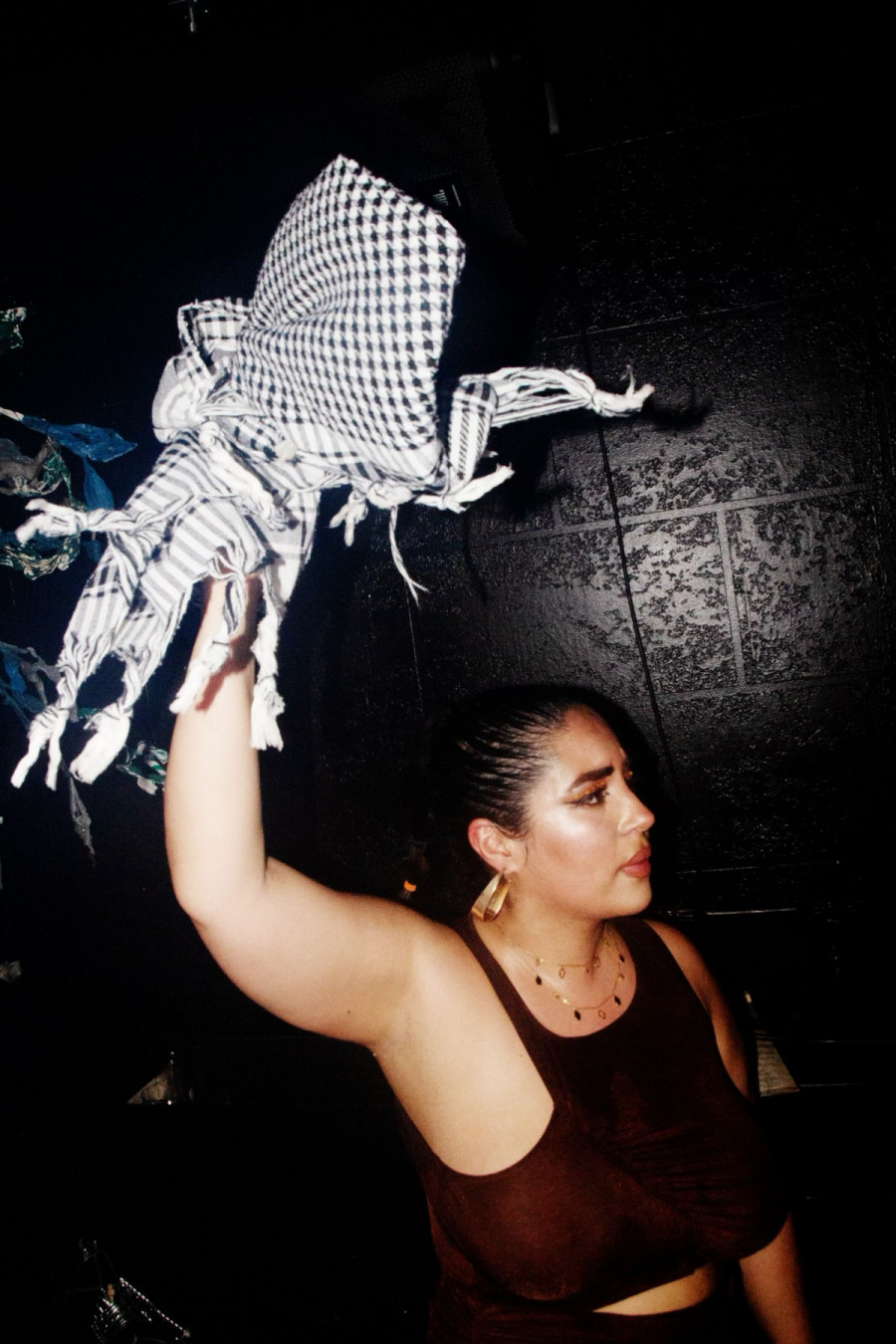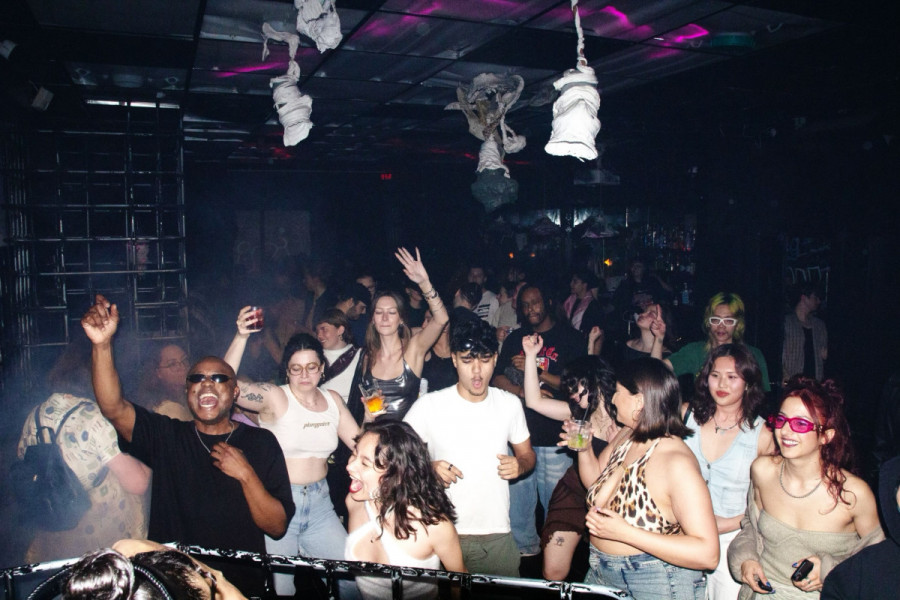A SWANA symphony
How Habibi Boom strengthens community and ignites curiosity in the Montreal music scene
In a city like Montreal, where cultures collide and manifest in various art forms, Habibi Boom is more than just a music collective; it’s a movement.
Focused on uplifting the sounds and talents of SWANA (Southwest Asia and North Africa) communities, Habibi Boom creates spaces where marginalized voices can be heard and celebrated. The collective’s dedication to curating SWANA sounds, blending tradition with modernity, serves as both an artistic expression and a form of activism that inspires creatives to embrace their identities through music.
Co-founders Isabelle Micati and Thierry Syriani, both of Levantine backgrounds, felt that Montreal’s music scene was lacking a vital piece: representation of SWANA cultures. Micati and Syriani felt this absence acutely. As active members of the city’s nightlife, they had a clear vision of their sound and knew how they wanted to expand within that space.
“We were missing from the scene,” Syriani explained. “Other cultures were being celebrated, and we thought, why not us?”
This realization fuelled their desire to create a space that not only showcased their rich heritage but also allowed others to experience the vibrant SWANA culture. Starting in 2019 as a passion project, they decided to test the waters, organizing semi-frequent events in bars and restaurants across the city. One of their first venues, a Haitian bar called Ti-Agrikol that has since closed down, was where they began carving out their niche while still figuring out their vibe.
With Montreal being a small city, they quickly realized that they needed to take the limited space they had and grow it, making every event worth it. The pandemic interrupted their early experimental phase, but by 2023 they were ready to go all in. Their sound was evolving, their DJs were gaining recognition and they felt it was time for expansion. The collective has now grown into a thriving movement that hosts numerous DJs of SWANA descent, providing a platform where their sounds can be claimed, curated and celebrated.

In my conversation with Micati and Syriani, their burning passion for Habibi Boom was undeniable. Their work is about more than throwing great parties; it’s about creating a community.
“It’s about the validation you feel as a person from this culture,” Micati shared, “and making it accessible for others to enjoy as well.”
This approach is evident in the intimate yet ever-growing crowds at their events. Attendees feel safe to express themselves, whether through traditional dance, fashion or simply enjoying the music that reminds them of home.
One of the standout talents in the Habibi Boom roster is DJ Manal Gaouaou, known by her stage name, Manalou. A self-described “citizen of the world,” Manalou has lived in various countries, but her roots in Algeria have always remained central to her identity. Her DJ sets are a vibrant medley of Algerian sounds, from classic to contemporary, infused with global influences.
“When I make my sets, I like to sit for hours and do research,” Manalou explained. “It feels like being a historian. I make sure to connect with my culture.”
Manalou’s journey as a DJ is not just about music, but rather reclaiming space as a North African woman in a male-dominated industry.
“I wanted to be, feel and let others know they can be the bad bitches of North Africa,” she said with a smile.

Manalou’s sets are a powerful fusion of music and cultural expression, enhanced by her choice of traditional attire. She often incorporates baladi belts into her dance breaks, sashes sewn with countless coins and beads that chime as she dances. She rocks the Palestinian keffiyeh as well as jewellery traditionally worn by the Indigenous people of Algeria and North Africa—also known as the Amazigh, the Mozabite and the Tuareg.
This blend of traditional clothing and accessories serves as more than just a stylistic choice; it’s a bold statement against Western perceptions that often reduce SWANA cultures to narrow stereotypes. Those stereotypes either portray them as too conservative to engage in artistic expression or confine them to clichéd Orientalist portrayals. For Manalou, DJing is a form of activism, a way to showcase the depth and nuance of North African culture while challenging stereotypes.
As an Algerian-Canadian myself, hearing familiar sounds woven into Habibi Boom’s DJ sets feels magical. Traditional wedding songs were transformed into club beats, showcasing the evolution of our cultural heritage. Manalou spoke about how often our music is confined to narrow expectations, categorized by those who don’t fully grasp the music’s depth.
Close your eyes and try to imagine TR-808 rhythms over Chaoui melodies, or electronic beats merging with the oud. These sets may be just music, but they are also narratives, weaved together with the old and the new, bridging cultures and generations. “We are reconnecting. We are making our parents' culture our own,” Micati said.
This sense of belonging and enjoyment extends beyond the SWANA community, as people from various cultures are drawn to the inclusive and vibrant atmosphere that is Habibi Boom events.
“We’re seeing more and more people interested in our culture,” Micati noted, “and it’s validating to know that others are enjoying it just as much as we do.”
This growing recognition has even led to opportunities beyond Montreal, with Habibi Boom DJs being invited to other cities.
“Inshallah, the future holds expansion—whether that’s here with bigger venues, more events, more DJs or even expanding internationally,” Syriani said. “We are ready to bring our sound everywhere else, and we are also ready to bring it back home.”
In a world where representation is often lacking, Habibi Boom stands as a representation of cultural pride. The future holds endless possibilities for this vibrant collective, but one thing is certain: Habibi Boom will continue to inspire, empower and break barriers for years to come.
This article originally appeared in Volume 45, Issue 1, published September 3, 2024.







